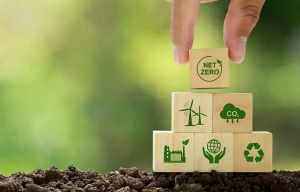Ho Chi Minh City needs to start carbon credit market quickly
How do you assess the advantages and limitations that Vietnam and Ho Chi Minh City are facing in the process of transitioning to a green growth model?
 |
| Muthukumara S. Mani, lead environmental and climate change economist, Southeast Asia region at the World Bank |
Vietnam's economy is growing rapidly. But to achieve the goal of becoming a high-income country by 2045, Vietnam needs to maintain its current growth rate.
However, the biggest challenge is climate change and changes in global production and consumption trends. More consumers are demanding green, sustainable products and services.
For example, if Vietnam wants to export to Europe, it must comply with the carbon border adjustment mechanism (CBAM), and this means that if a product is produced that emits a lot of carbon, it must pay more tax. This will create motivation for manufacturers to reduce carbon emissions. In addition, Vietnam has also set a net-zero emissions target by 2050, and it is beneficial for everyone to achieve this goal in the most economical way.
Ho Chi Minh City has set a target of reducing emissions by 10 per cent by 2030 and moving towards a low-carbon economy, with the possibility of a 30 per cent reduction. How do you evaluate this goal?
I think this is quite an ambitious goal, but it does not mean that it is impossible. Because most of these emissions come from industrial production, this is easier to cut than emissions from traffic with hundreds of thousands of vehicles.
In particular, manufacturers are now following the world's trend of cutting emissions. I believe that Ho Chi Minh City can be a leading locality to build an image of a green and sustainable city.
The Vietnamese National Assembly has just allowed Ho Chi Minh City a number of new mechanisms for green development, such as converting fossil vehicles to green energy, developing green urban areas, exchanging and offsetting carbon credits.
This is a very good opportunity for Ho Chi Minh City to cut emissions as well as promote green growth. Developing a carbon credit market is a process that must be started right now.
First, to develop a carbon credit market, we must identify buyers and sellers. The buyers are businesses and international governments.
However, one thing we must double-check that is necessary to reduce emission of enterprises is that we need to establish a mechanism to verify and recognise carbon certificates to ensure their validity. Establishing this mechanism requires financial resources for both buyers and sellers, which can come from banks or the government.
One advantage of establishing a carbon credit market is that it not only helps the city have financial resources from banks but can also sell these credits to the world, reducing borrowing costs by about 20 per cent.
How can Ho Chi Minh City start to build a carbon credit trading floor?
If Ho Chi Minh City wants to sell carbon credits to the world, it is not necessary to set up an exchange floor in the city because there are already existing international exchange floors. You just need to sell those carbon credits internationally, and Ho Chi Minh City can take advantage of the current opportunity when there is a lot of demand from the international market.
Domestically, as more businesses reduce emissions, there will automatically be a domestic trading market formed. As far as I know, Vietnam is currently pushing heavy industries such as steel production and energy to reduce emissions. If so, these businesses can buy carbon credits from other domestic industries.
What should domestic businesses focus on when participating in international carbon credit exchange floors?
Firstly, businesses need to have an idea or project and bring it to units that can verify it. For example, the World Bank can verify this idea, and provide financial resources or find partners involved in buying and selling carbon credits. That is also the reason why we (the World Bank) are trying to cooperate with Ho Chi Minh City to create a mechanism to connect buyers, sellers and verifiers.
 | Vietnam seals major carbon credit deal, fetching $53 million Vietnam has successfully executed a landmark transaction, selling 10.3 million tonnes of CO2 emission credits to the World Bank for nearly VND1.25 trillion VND ($52.74 million), as confirmed by the Ministry of Agriculture and Rural Development to the prime minister on December 28. |
 | Hoi An orders collection of shipwreck’s carbon isotope samples The collection of carbon isotope samples has been ordered to determine the age of a sunken wooden ship recently discovered near the coast of Cam An ward in the central province of Quang Nam’s Hoi An city. |
 | World Bank to support Ho Chi Minh City on carbon credits The opportunities and challenges presented by operating a carbon credit market in Ho Chi Minh City in line with the World Bank were the main talking points of a meeting on January 24 between Chairman of Ho Chi Minh City People's Committee Phan Van Mai and World Bank experts at an investment conference centred around green growth on January 24. |
What the stars mean:
★ Poor ★ ★ Promising ★★★ Good ★★★★ Very good ★★★★★ Exceptional
Related Contents
Latest News
More News
- Vingroup consults on carbon credits for electric vehicle charging network (January 28, 2026 | 11:04)
- Bac Ai Pumped Storage Hydropower Plant to enter peak construction phase (January 27, 2026 | 08:00)
- ASEAN could scale up sustainable aviation fuel by 2050 (January 24, 2026 | 10:19)
- 64,000 hectares of sea allocated for offshore wind surveys (January 22, 2026 | 20:23)
- EVN secures financing for Quang Trach II LNG power plant (January 17, 2026 | 15:55)
- PC1 teams up with DENZAI on regional wind projects (January 16, 2026 | 21:18)
- Innovation and ESG practices drive green transition in the digital era (January 16, 2026 | 16:51)
- Bac Ai hydropower works stay on track despite holiday period (January 16, 2026 | 16:19)
- Fugro extends MoU with PTSC G&S to support offshore wind growth (January 14, 2026 | 15:59)
- Pacifico Energy starts commercial operations at Sunpro Wind Farm in Mekong Delta (January 12, 2026 | 14:01)

 Tag:
Tag:




















 Mobile Version
Mobile Version